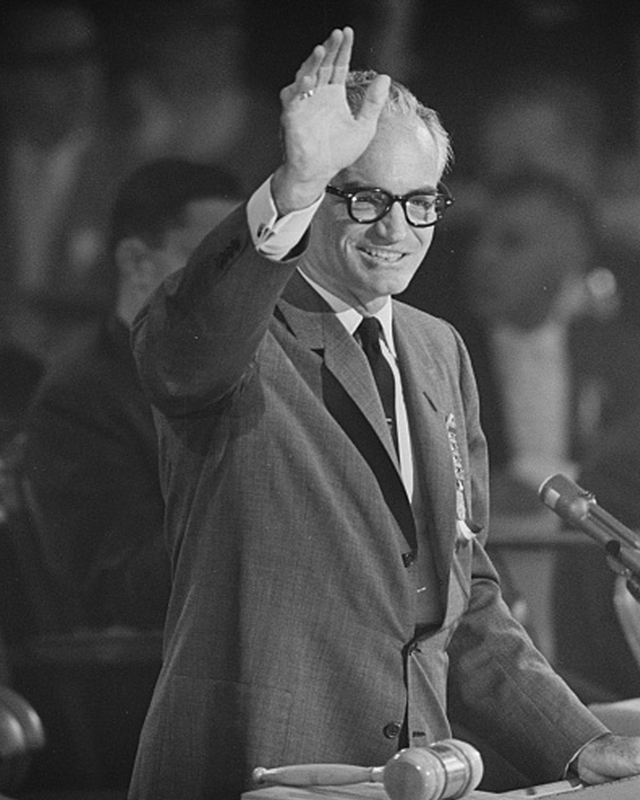Introduction
Barry Goldwater (1909–1998) was a Republican who served as U.S. senator from Arizona from 1953 to 1965 and from 1969 to 1987. He is best known as the Republican Party’s presidential candidate in 1964, an election that he lost decisively to Lyndon Johnson. In this speech, Goldwater, who like Sen. Robert Taft was a defender of Congress’ role in foreign policy, opposed President Jimmy Carter’s unilateral revocation of the mutual defense treaty between the United States and the Republic of China (Taiwan). (Nationalist Chinese forces had lost a civil war to the Communists on mainland China and fled in 1949 to Taiwan, where they reestablished the Republic of China.) Carter cancelled the treaty with Taiwan so that he could negotiate an agreement with the new regime, the People’s Republic of China. The dispute between Senator Goldwater and President Carter eventually reached the Supreme Court, which ruled in Goldwater v. Carter (1979) that it lacked jurisdiction to settle the matter—leaving delicate questions involving foreign relations to the political branches for resolution.
—J. David Alvis and Joseph Postell
The subject I have in mind is the termination of treaties, particularly the mutual defense treaty, between the United States and the Republic of China, without the approval of either the Senate or Congress. Negotiators for the U[nited] S[tates] had no authority to accept or consider this policy because the Constitution clearly requires a role for the Senate or Congress in the termination of any treaty. . . .
Constitutional Text
It is true that the Constitution does not spell out in precise words how a treaty shall be terminated, but the clear import of the constitutional text, supported by the overwhelming weight of historical practice, makes it certain that a treaty cannot be nullified by action of the president alone, without the approval of the Senate or Congress. Nor can a president acting alone give valid notice on behalf of the United States of our intention to withdraw from a treaty.
Section 2 of Article II of our Constitution specifies that the president “shall have power, by and with the advice and consent of the Senate, to make treaties provided two-thirds of the senators present concur.”
Thus, the role of the Senate in making treaties is beyond any doubt.
The Constitution further declares, in Article VI, that “all treaties. . .shall be the supreme law of the land.”
Since treaties are therefore legislative in nature, being made with the approval of the Senate, and having the same status as any other law, it is logical that the same authorities who make treaties, or at least one of equal competence, would be necessary to undo treaties. Just as the president alone cannot repeal a law, so he cannot “repeal” a treaty.
In other words, a treaty, being a law, can only be abrogated either by the treaty-making, or lawmaking, power.
This is indeed the way treaties generally have been terminated in actual practice. The precedents are not uniform, but far more often than not the Senate, or the whole Congress, has both exercised and asserted its power to approve the nullification of treaties, and presidents usually have sought legislative approval before denouncing any treaty on behalf of the United States. . . .
[Senator Goldwater went on to an extensive discussion of many historical precedents in which treaties were abrogated, the majority of which were understood to require congressional agreement.
The Power to Recognize Governments Does Not Include the Power to Terminate Treaties
. . .[A]lthough the president is generally seen as possessing the power to recognize new states and governments, or to decline recognition, based primarily upon his express power to “receive ambassadors and other public ministers,” this in no way entrusts the president with power to terminate treaties. The two powers are entirely separate. . . .
The Sanction of Impeachment Is a Check on Abuses of Presidential Power
In conclusion, no president acting alone can abrogate, or give notice of the intention to abrogate, existing treaties with the government on Taiwan unless he obtains the advice and consent of the Senate or the approval of Congress.
Now, I regret to raise this point, but it must be clearly understood by all, that the check of impeachment is one of the safeguards provided by the Founding Fathers against political offenses, such as an irresponsible abuse by a president of a constitutional discretion. . . .
This is not a threat. It is a simple statement of fact which those who are unwisely urging this course of action upon the president should understand. They apparently do not know the consequence of what they are asking the president to do.

































































































































































































































































